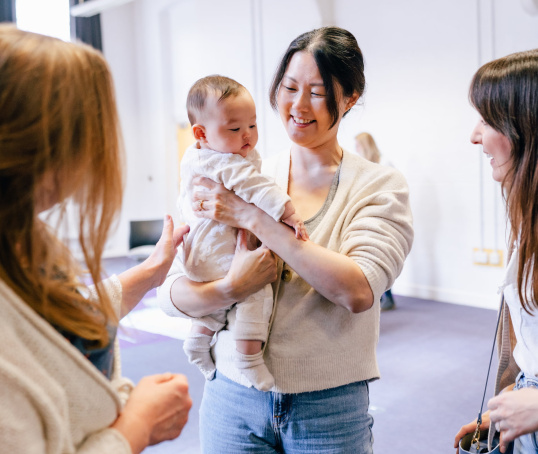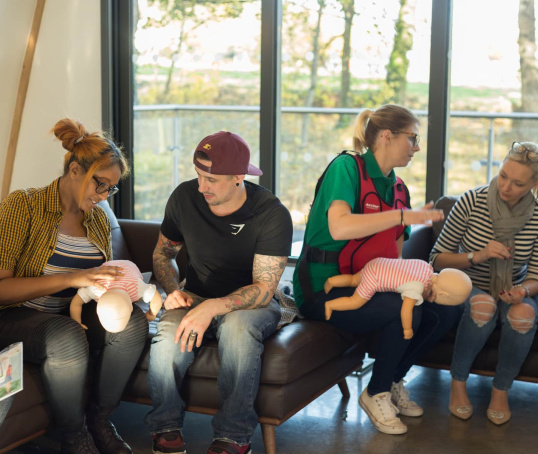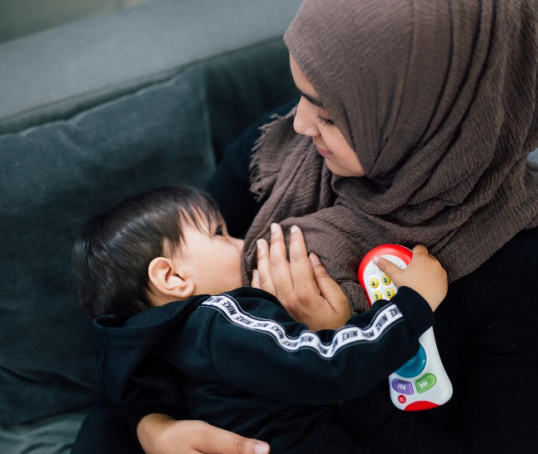Between three and six months, your baby will become stronger and more mobile. This is an exciting time for both of you.
Development
This is an exciting time for both of you with plenty to look forward to, like your baby’s first laugh. At this age your baby will also be keen to play.
Your baby is getting stronger and more active so it’s a good idea to keep safety in mind – see our tips below. They might surprise you at how quickly they can roll and grab.
Your baby will really enjoy copying your facial expressions, babbling and mimicking sounds you make. They will love to hear you reading, chatting or singing to them. You can encourage them to roll over, practice ‘tummy time’, play games and chat to you.
Babies develop at different rates but generally by six months your baby will be able to:
• roll onto their front
• push up on their forearms and look around
• sit with support from a parent
• pick objects up and bring them to their mouth
• babble and mimic sounds you make. (NHS Choices, 2016a)
If you are concerned about your baby’s development, talk to a healthcare professional to put your mind at ease.
Every baby is different
Let your baby develop at their own pace and encourage their achievements, whether they are eager to be on the move or are an early chatterbox. Just remember that when they do things is less important than how and what they do.
Some parents like to learn how to massage their baby massage around this time. You could include baby massage into your baby’s bedtime routine to help your little one relax and go to sleep. Massage a great way of strengthening your bond with your baby. NCT baby massage courses also give you the chance to meet other local parents with babies of a similar age.
Feeding
Some babies who drink breast milk are still feeding frequently at this age. If you are breastfeeding, you may be able to leave your baby with another adult for a couple of hours between feeds, while you have a rest. You could also try expressing milk, so that someone else can feed them while you have time out or return to work.
The Department of Health recommends waiting until your baby is six months old to introduce solid foods. If your baby is younger than this and seems hungrier than usual they may be having a growth spurt. You can offer them more milk feeds.
Whether you feed your baby breast milk, formula or a combination, we're here to support you. Call our helpline for practical and emotional support on 0300 330 0700.
Teething
Your baby may start teething around now – although every baby is different.
Most babies start teething around 6 months (NHS choices, 2016b).
Your baby’s health
When your baby is four months old, it’s time for their booster vaccinations. You can expect the following boosters:
- The 6-in-1 vaccine: diphtheria, tetanus, whooping cough (pertussis), polio, Hib (Haemophilus influenzae type b), hepatitis B
- Meningitis B
-
Pneumococcal conjugate vaccine (PCV).
(NHS Choices, 2016c)
Find out more in our immunisations article.
Sleeping
Your baby will probably need less sleep now than before (St James Roberts, 2012), although three month old babies can still sleep for about 14 to 16 hours a day. You might find your baby is getting into a more settled pattern of sleeping for longer periods at night.
You can encourage this by developing a bedtime routine at the same time each evening and doing the same activities each night. Their routine might include a bath, feed and a story. Bed and bath time can be a great time for dads or partners to be involved and spend some special time with your baby.
Playtime
Your baby will start to enjoy a wider range of games at this age. So get ready to have some fun with the classics like ‘peek-a-boo’. Get more ideas in our games to play with your baby at this age.
Safety
As your baby gets older and more mobile, remember to keep your baby’s safety in mind:
1. Keep small objects out of the way – your baby could pick them up and choke on them.
2. Don’t leave your baby unattended on a bed or other surface that they could roll off.
Taking care of yourself
Being a new parent will still be hard work at this stage, despite some babies being described as more settled. Try to get as much help as you can - from your partner, relatives or friends. Make time for yourself. Going for a short walk, reading a book, having a chat with a friend or having a lie-down can help refresh you.
Sex after baby
You and your partner might start thinking about sex post-baby at this stage, or it could still be the activity furthest from your mind. Whatever you feel about sex, don’t feel pressured and don’t compare yourself to other mums.
Share your thoughts with your partner and explain the big changes that pregnancy, childbirth, and caring for a new baby bring. Only you can decide when you’re ready to take the next step. Read more in our article called Sex after having a baby.
Finances
Another issue that might be on your mind is money. If you're used to earning your own money, being on maternity leave can take some adjustment. It can be difficult living on just your partner's wage and lots of mums miss their financial independence.
It's a good idea to sit down together to discuss this. Today there are lots of options to consider including shared parental leave, parents working alternate days, and returning to work full or part-time.
Further Information
Our support line offers practical and emotional support with feeding your baby and general enquiries for parents, members and volunteers: 0300 330 0700.
You might find attending one of NCT's Early Days groups helpful as they give you the opportunity to explore different approaches to important parenting issues with a qualified group leader and other new parents in your area.
Make friends with other parents-to-be and new parents in your local area for support and friendship by attending local NCT activities near you.
NHS Choices. (2016a) Birth to five development timeline. Available from: https://www.nhs.uk/Tools/Pages/birthtofive.aspx [Accessed 1st October 2017].
NHS Choices. (2016b) Baby teething symptoms. Available from: https://www.nhs.uk/conditions/pregnancy-and-baby/teething-and-tooth-care/ [Accessed 1st October 2017]
NHS Choices. (2016c) Vaccinations. Available from: http://www.nhs.uk/Conditions/vaccinations/pages/vaccination-schedule-age-checklist.aspx [Accessed 1st October 2017].
St James Roberts I. (2012) The origins, prevention and treatment of infant crying and sleeping problems. London, Routledge. [Accessed 1st October 2017].
Further reading
Bennett C, Underdown A, Barlow J. (2013) Massage for promoting mental and physical health in infants under the age of six months. Cochrane Database Syst Rev;(4):CD005038. Available from: http://www.cochrane.org/CD005038/BEHAV_massage-for-promoting-mental-and-physical-health-in-infants-under-the-age-of-six-months [Accessed 1st October 2017].
NHS. (2015) What to expect after vaccinations. Available from: https://www.gov.uk/government/uploads/system/uploads/attachment_data/file/448789/8584-what-to-expect-after-vaccination-2015-2P-A5-02-web.pdf [Accessed 1st October 2017].




